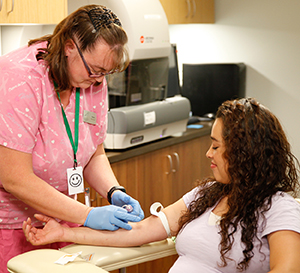If you have Rh-negative blood, your baby may be at risk for health problems. This is true only if your baby has Rh-positive blood. A simple test followed by treatment can help prevent problems.
What are the risks?
If the blood of your baby is Rh positive, your Rh-negative blood may form antibodies. These antibodies will attack the Rh-positive blood. This is called Rh disease. Rh disease can cause your baby to lose blood cells or have other health problems. Medical treatment can prevent Rh disease by keeping antibodies from forming.
How are you tested?
A simple blood test shows if you’re Rh negative. This test is done very early in your pregnancy. If you’re Rh negative, you’ll have a second blood test near week 28 of pregnancy. This test will check whether or not your blood contains Rh antibodies.


